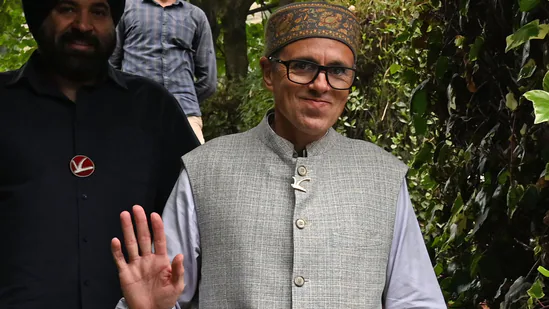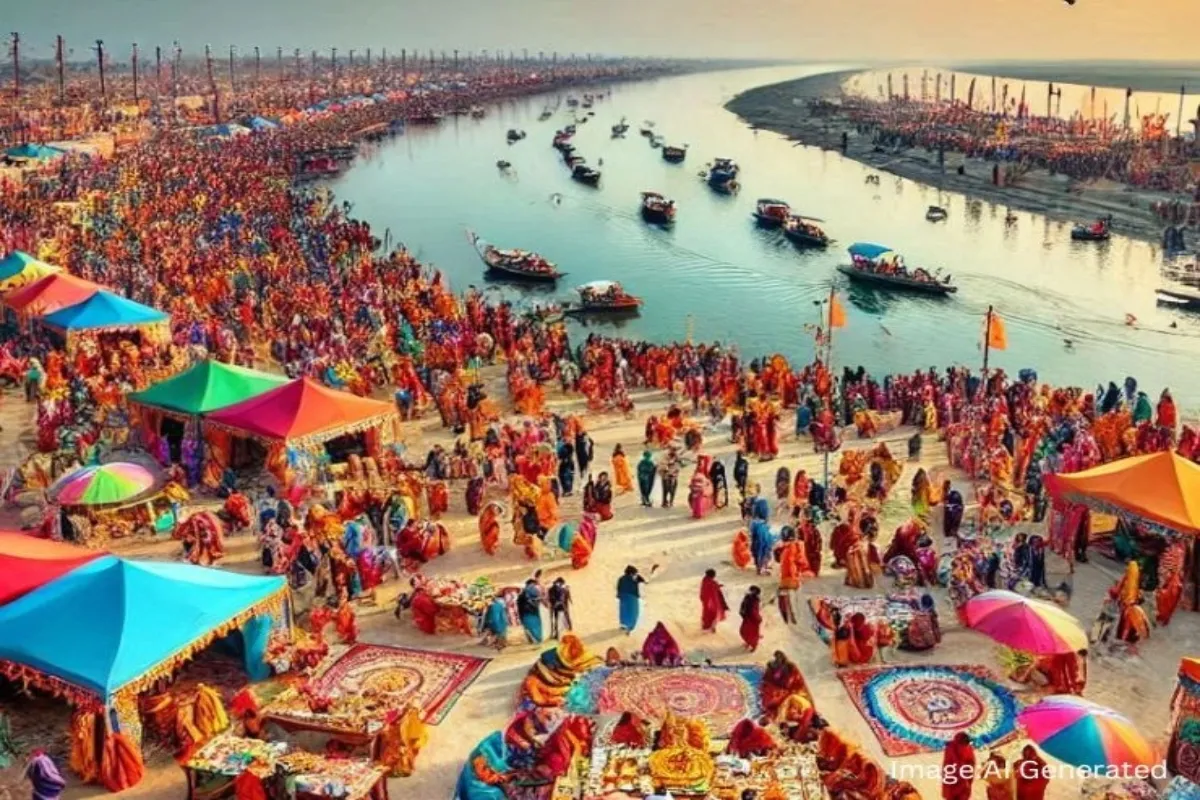CM Yogi Adityanath: Inaugurates Silk Expo; honours 16 farmers, entrepreneurs, institutions, and designers with the prestigious Pandit Deendayal Upadhyaya Resham Ratna Award.
UP the first state in the country to come up with a policy for traditional products, says CM
Lucknow, October 22
CM Yogi Adityanath, on Tuesday, said that Uttar Pradesh and India at large, have both the potential and resources to compete with the major global players in readymade garments.
CM Yogi Adityanath also releases the latest edition of ‘Resham Mitra’ magazine; expo to conclude on October 28
Inaugurating the Silk Expo at the Indira Gandhi Pratishthan, which runs from October 22 to 28, the Chief Minister said, “Small nations worldwide have established a strong presence in the readymade garment industry, even with limited resources and opportunities. We, on the other hand, have both the potential and resources.”
He added: “If a significant portion of the workforce, especially women, is engaged in silk production, processing, readymade garments, designing, marketing, and packaging, Uttar Pradesh and India can emerge as global leaders in the garment industry.”
He urged stakeholders to leverage the initiatives taken by the state government to realize this vision.
The CM Yogi Adityanath highlighted a remarkable achievement in silk production, which has increased 84-fold under the current administration. “A day will come when Uttar Pradesh will be recognized among the top states in the country for silk production,” he added.

Farmers and entrepreneurs had to suffer due to the misdeeds of previous governments: CM Yogi Adityanath
He also released the ‘Resham Mitra’ magazine and honored 16 farmers, entrepreneurs, institutions, and designers with the Pt. Deendayal Upadhyaya Resham Ratna Samman. Following the ceremony, he toured the exhibition.
CM Yogi Adityanath highlighted that since the BJP government came to power in 2017, Uttar Pradesh has taken significant steps to promote traditional products. The state became the first in India to implement a dedicated policy for traditional crafts, identifying a unique product for each of its 75 districts under the “One District, One Product” (ODOP) initiative.
By linking ODOP with market access, design, and packaging, the initiative has not only created employment, but also boosted the export of traditional goods. Today, all 75 districts have distinct GI-tagged products recognized across the country, he pointed out.
The Chief Minister emphasized the potential for further growth, particularly through the famous sarees of Varanasi, Bhadohi, and Mubarakpur. He encouraged efforts to make the Silk Expo a platform for advancing Uttar Pradesh’s prospects in this sector.
Referring to the age-old slogan of “roti, kapda aur makaan” (food, clothing, and shelter), CM Yogi stressed that while air and water are essential for life, the need for food, clothing, and shelter is equally fundamental.
He noted that clothing not only meets a basic need but also serves as a vital means to boost farmers’ income and generate employment. Uttar Pradesh, with its population of 25 crores, has a vast potential in silk production, and while progress has been made in recent years, much more remains to be achieved to match the state’s immense possibilities.
Chief Minister Yogi Adityanath urged people to explore the vast potential for development within Uttar Pradesh. He pointed out that places like Varanasi, Bhadohi, and Azamgarh, known for their silk sarees such as those from Mubarakpur, hold significant promise.
“The central and state governments are making concerted efforts to develop silk clusters in these regions. Varanasi silk sarees, a popular choice for auspicious occasions nationwide, have seen increased demand following the expansion of Kashi Vishwanath Dham, which has attracted more devotees and tourists. The establishment of a Trade Facilitation Center at the Varanasi Expo Mart has further boosted this traditional industry”, CM Yogi asserted.
He highlighted the progress of entrepreneurs associated with the saree industry in Mubarakpur and the silk clusters in Mirzapur, Varanasi, and Bhadohi, indicating that the sector has considerable growth potential.
The upcoming PM Mitra Park, a large textile hub on the Lucknow-Hardoi border, will cover 1,000 acres and host various textile-related industries, showcasing Uttar Pradesh’s potential in this field, he noted.
However, the Chief Minister emphasized the need for local raw material production to support these initiatives. He encouraged farmers to participate, noting that the central government offers several schemes for their benefit.
Furthermore, he called on the relevant departments to organize symposiums, seminars, and outreach programs in every district to inform progressive farmers about these schemes and connect them with training and processing programs.
This initiative aims to enhance opportunities, not just in the Gorakhpur division but also in Varanasi, Mirzapur, Lucknow, Devipatan, Basti, and Azamgarh.

CM Yogi Adityanath highlighted that Uttar Pradesh, with its nine climatic zones, offers a unique opportunity to develop and promote diverse agricultural products across different regions. The state has immense potential, especially in areas like Varanasi and Azamgarh, which have been hubs for the silk industry since ancient times.
He emphasized the importance of locally linking silk production and processing with the textile industry to ensure affordable raw materials, which would naturally lower costs and make products more accessible to meet market demand. The government, he assured, will support training initiatives, and assist in raw material procurement, processing, marketing, and design.
The CM Yogi Adityanath pointed out that farmers and entrepreneurs in Uttar Pradesh have long been connected to traditional crafts, but faced setbacks due to the neglect of previous governments, which failed to provide proper incentives, design support, and packaging for their products. This challenge extended beyond silk to all traditional industries.
Today, the state showcases a variety of unique products: Bhadohi’s carpets, Gorakhpur’s terracotta, Varanasi’s numerous GI-tagged items, leather goods from Agra and Kanpur, Moradabad’s brassware, Firozabad’s glass, and sports equipment from Meerut.
These products represent Uttar Pradesh’s rich heritage and provide a platform for youth and entrepreneurs to advance through traditional industries, he pointed out.
The Chief Minister called for a rapid expansion of silk clusters in regions with the potential, urging the relevant departments to collaborate with farmers who could act as “silk friends,” helping to realize this potential and position Uttar Pradesh as a strong competitor among other states.
He stressed the importance of timely incentives to better showcase the state’s capabilities to the world. The upcoming PM Mitra Textiles Park in Lucknow is poised to play a key role in furthering these opportunities.
CM Yogi Adityanath emphasized that silk garments are rooted in indigenous technology, and there is a need to continuously upgrade and adapt this technology. He pointed out the evolution from the traditional hand-operated spinning wheel for khadi, to electric-powered versions, which increased efficiency five to ten times with the rise in electricity use. To further reduce energy costs, solar-powered spinning wheels have now been introduced.
Similarly, silk production must integrate modern processing techniques and align with updated spinning programs, the CM emphasized. He highlighted that alongside daily activities, these initiatives can promote women’s self-reliance at the local level. Such efforts are progressing in line with Prime Minister Modi’s vision for women’s empowerment under the Mission Shakti initiative.
On this occasion, MSME Minister Rakesh Sachan, Chief Secretary Manoj Kumar Singh, Agriculture Production Commissioner Monica S. Garg, Member Secretary Central Silk Board New Delhi P. Shivkumar, Additional Chief Secretary (Silk) BL Meena, Director (Silk) Sunil Kumar Verma etc. were present.
Honor given by CM Yogi Adityanath
The Chief Minister awarded the Pandit Deendayal Upadhyaya Silk Ratna Award to 16 farmers, entrepreneurs, institutions, and designers. They were honored with the first prize of Rs 50,000 and the second prize of Rs 25,000, along with a memento, and a citation.
1- Cocoon Production Award: Jagram (Bahraich) got the first prize, whereas Mala Devi from Kushinagar got the second.
2- Lifetime Achievement Award: Dr. NV Chaudhary, Director, Central Tasar Research and Training Institute, Central Silk Board, Ranchi (Jharkhand) got the first prize, while Haseen Ahmed Ansari M/s Qasim Silk Emporium Varanasi got the second prize.
3- The first prize in the best-designed silk-made garment was given to Angika Kushwaha of Ramnagar Varanasi and the second to Sarvesh Kumar Srivastava (Varanasi). Ranjana Srivastava received the award on Sarvesh’s behalf.
4- Best designing in other silk-made products: Mukhtar Ahmed (Bhadohi) got the first prize and Iftikhar Ahmed (Azamgarh) got the second.
5- Innovation in silk finished product textile: First prize was given to Aditi Jaggi Rastogi of Hazratganj, Lucknow, and second to Mrs. Sangeeta Basant, Kanya Mahavidyalaya, Varanasi.
6- Top Cocoon Seller – First Prize in Yarn Sales – First prize went to Shashi Shukla of Pilibhit and the Second to Rajnath Verma of Sonbhadra.
7- Top Textile Seller – Silk Finished Product – First Prize was bagged by Viresh Shah (Varanasi), and the Second Prize by Pankaj Shah (Varanasi).
8- Innovation in Cocoon Production – First prize to went to P. Shivkumar IFS, Member Secretary Central Silk Board and the Second Prize to Dasharathi Behera, Deputy Secretary Technical, Central Silk Board, New Delhi.




